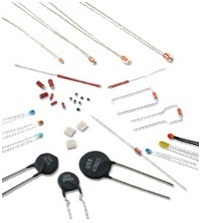Thermally Sensitive Resistors / Thermistors
Thermally Sensitive Resistors

Our product range includes a diverse selection of NTC thermistors and PTC thermistors, catering to a wide array of applications such as heater elements, motor temperature validation, and overcurrent protection in electronics. These thermistors find utility across various industries, including Aerospace, Automotive, Energy, Defense, and more. A thermistor, also known as a thermal resistor, is a specialized device that exhibits a significant change in resistance in response to variations in body temperature. By leveraging this unique characteristic, thermistors play a vital role in temperature sensing and control applications.
There are two types of Thermistors:
PTC: (Positive Temperature Coefficient) Thermistor, the resistance will increase as temperature does.
NTC: (Negative Temperature Coefficient) Thermistor, the resistance will decrease as temperature does.
NTC types have some what of a linear change over a wide temperature range. PTC types have a sharp change of value over a small temperature range.
Thermistors are thermally sensitive resistors whose prime function is to exhibit a large, predictable and precise change in electrical resistance when subjected to a corresponding change in body temperature. Negative Temperature Coefficient (NTC) thermistors exhibit a decrease in electrical resistance when subjected to an increase in body temperature and Positive Temperature Coefficient (PTC) thermistors exhibit an increase in electrical resistance when subjected to an increase in body temperature.
A thermistor is an element with an electrical resistance that changes in response to temperature. This name is derived from the more descriptive term "thermally sensitive resistor," the original name for these devices. Thermistors were first discovered by Michael Faraday in 1833, although commercially useful thermistors weren't manufactured until 1930. They're now widely used in a variety of electronic applications, most often as temperature sensors. Additional uses of thermistors include current limiters, current protectors and heating elements.
A thermistor's change in electrical resistance due to a corresponding temperature change is evident whether the thermistor's body temperature is changed as a result of conduction or radiation from the surrounding environment or due to "self heating" brought about by power dissipation within the device.
Thermistors are highly accurate temperature sensors known for their reliability. They function as resistors with resistance that varies significantly with changes in temperature. This type of resistor finds common applications as an inrush current limiter, temperature sensor, self-resetting overcurrent protector, and self-regulating heating element. Thermistors are categorized into two types based on the sign of k, which represents the first-order temperature coefficient of resistance. When k is positive, the resistance increases with temperature, resulting in a positive temperature coefficient (PTC) Thermistor, also known as a posistor. Conversely, when k is negative, the resistance decreases as the temperature rises, leading to a negative temperature coefficient (NTC) Thermistor. Both PTC and NTC Thermistors are utilized in a wide range of applications. NTC thermistors, for example, are commonly employed in measuring coolant and oil temperatures in automobiles, while digital thermostats, battery packs, and televisions may incorporate both types for various temperature monitoring purposes.
Thermally sensitive resistors, commonly known as thermistors, are electronic components that exhibit a significant change in resistance with temperature variation. They are specifically designed to be sensitive to temperature changes and are widely used in temperature sensing and compensation applications.
Industries Served
Medical
Thin film thermistors featuring ultra-miniature size, excellent response time and high-accuracy, make temperature sensing possible within the most stringent physical limitations. Highly recommended for various types of catheter applications.
Automotive
Thermistors can be found across a broad range of automotive applications including battery, motor, inverter, HVAC and ECU temperature management.
Office Automation
Thermistors are being used across the globe in office equipment including printers and copiers. Our contact and non-contact sensors for example, are critical components essential for temperature management of laser printer fuser assemblies.
Home Appliances
Thermistors can also be found in a wide variety of home appliances ranging from HVAC equipment, microwave ovens, gas stoves/ranges, refrigerators to water heaters.
NTC Thermistors: Comprehensive Sensing Solutions
NTC thermistors are temperature sensors with the distinctive characteristic of decreasing resistance as temperature increases. They are extensively used in:
- Temperature control and measurement
- Electric vehicles
- HVAC systems
- Medical devices
- Automotive electronics
We provide a range of support services including technical guidance, custom design, and prototyping. Our dedication is to deliver top-quality products and services. Contact us today to learn more about our NTC thermistors and how we can support your needs.
